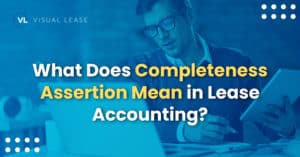
Inaccurate lease accounting can lead to a host of problems for an organization, such as wasting time and resources and a failed audit. In the final stages of the auditing process, accounting professionals will test the assertions in a company’s financial statements, including the completeness assertion. Let’s look at what completeness assertion is in lease accounting and how to ensure its accuracy when preparing for audits.
What is completeness assertion in lease accounting?
On a financial statement, completeness assertion affirms that the statement is thorough, includes and details all required items for a particular accounting period and that the organization’s entire inventory is included in the total inventory figure.
In lease accounting specifically, the completeness assertion claims that all leases have been captured and properly capitalized on the balance sheet.
Auditing completeness under ASC 842
Completeness is a significant audit area for leases. With the ASC 842 standard, organizations must recognize assets and liabilities on the balance sheet for both operating and finance leases. It’s now crucial for companies—whether private or public—to have an accurate and thorough accounting of all leased assets to ensure completeness.
What is audited under completeness assertion?
When a business is audited under ASC 842, an auditor will assess completeness across several areas, including:
- Lease calculations: Auditors make sure initial balances are calculated correctly and that lease expenses and ROU asset amortization are accurately recorded. They’ll also check to make sure all lease transactions are recorded within the stated period.
- Quantitative and qualitative footnote disclosures: Auditors check footnote disclosures to ensure all information—including assets, liabilities, lease expenses, cash flow and more—are properly recorded. They also look at the qualitative information that explains what the numbers mean for the company.
- Embedded leases: It’s easy to overlook or improperly record embedded leases, which are leases within a larger contract. Auditors make sure all embedded leases are clearly and correctly recognized in your company’s financial statements.
How to ensure accurate completeness assertions
With the new accounting standards, each lease under a business now directly impacts the balance sheet. Not having an accurate, complete representation of all leases could result in an understatement of assets and liabilities.
As a result, businesses must identify all arrangements that meet the definition of a lease per ASC 842 to ensure completeness. Ignoring this step can lead to a waste of time, money and professional resources, especially during audits, along with costly fines or penalties if financial statements are misrepresenting leased assets.
Identifying a complete population of leases can be a large undertaking, depending on how centralized a business’ operations are. Typically, this process involves inquiries with department heads along with a detailed review of accounts payable. Because of this, it’s important to maintain seamless and ongoing communication across departments.
Getting started with lease compliance
Companies that are in the process of adopting ASC 842 may also find they need new systems or protocols to preserve completeness on an ongoing basis. The right lease administration and accounting software can help save time and resources by enabling teams to regularly capture all details of leased assets as well as efficiently compile all completeness evidence before audits.
Interested in lease accounting?
Take the next step and schedule a demo with Visual Lease to ease your lease accounting needs today!























